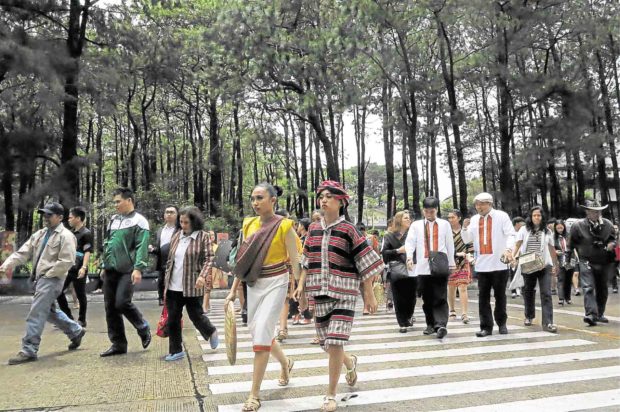GSIS won’t sell Baguio tree park

Credit to Author: besguerra| Date: Mon, 11 Feb 2019 21:17:28 +0000
BAGUIO CITY — The city’s foresters and environmental groups are drawing up plans for the management of a 1-hectare pocket forest, which Baguio children have asked President Rodrigo Duterte to spare from developers.
Kindergarten and elementary pupils of Baguio Pines Family Learning Center here wrote more than 60 letters, many illustrated with trees and stick figures using crayons, asking Mr. Duterte to stop developers from touching the tree park classified as an “investment area” of its owner, the Government Service Insurance System (GSIS).
In a Feb. 4 reply, Jesus Clint Aranas, GSIS president, said the agency “will neither sell the land where the park stands nor allow it to be converted into a commercial area by any party.”
Concern for environment
“They can heave a sigh of relief because the GSIS property will remain the home of these beautiful trees,” Aranas said in a statement posted on the pension fund’s website.
“We all share the same concern for the environment. If we are responsible stewards of God’s gifts, then we will surely reap the rewards such as having cool, clean and fresh air.”
Should the Baguio government again offer to buy the pine tree stand given the GSIS’ latest assurance, the City Environment and Parks Management Office (Cepmo) was prepared to treat the soil and replace infested trees to protect the woodland, Ruben Cervantes, city environmental officer, said on Monday.
It is the biggest patch of trees in an area surrounded by the summer courthouses of the Supreme Court and the Court of Appeals; Luneta Hill, which is now occupied by a shopping mall; a convention center; and the University of the Philippines (UP) Baguio.
However, its pine tree population had been reduced from 800 to over 500, half of which suffered from Ips calligraphus infestation, according to a UP team.
Home to birds
Cervantes said city foresters tried to contain the infestation by cutting and burning down infected trees in 2014 when their help was sought by the GSIS.
Around 24 bird species, like warblers, thrushes and the brown shrike, as well as grassland animals, are found in the tree park, according to the UP team.
These animals might be driven away because of man-made pollution when people started using the park as a toilet, so it would be Cepmo’s task to clean up once city foresters acquired control over the area, Cervantes said.
The city government succeeded in blocking plans to lease the park to a developer in 2008 due to a public outcry.
But it failed to work out a deal with the GSIS, which was willing to sell the tree park for P400 million in 2016, and again for P670 million in November 2017.
Mayor Mauricio Domogan last month said the GSIS was no longer willing to sell the property.
But Aranas said he was optimistic that the negotiations with the city government to buy the lot would “finally come to a fruitful resolution.”
“I hope the good mayor would understand that the value of a property appreciates over time. In any decision, investment or otherwise, we have to ensure that this will help grow our funds to benefit our members and pensioners,” he said.